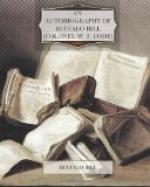At Gravesend we sighted a tug flying the American colors, and when the band on board responded to our cheers with “The Star-Spangled Banner” even the Indians tried to sing. Our band replied with “Yankee Doodle,” and as we moved toward port there was more noise on board than I had ever heard in any battle on the Plains.
When the landing was made the members of the party were sent in special coaches to London. Crowds stared at us from every station. The guards on the train were a little afraid of the solemn and surly-looking Indians, but they were a friendly and jovial crowd, and when they had recovered from their own fright at the strange surroundings they were soon on good terms with the Britishers.
Major John M. Burke, who was my lifetime associate in the show business, had made all arrangements for housing the big troupe. We went to work at our leisure with our preparations to astonish the British public, and succeeded beyond our wildest dreams. The big London amphitheater, a third of a mile in circumference, was just the place for such an exhibition. The artist’s brush was employed on lavish scale to reproduce the scenery of the Western Plains. I was busy for many days with preparations, and when our spectacle was finally given it was received with such a burst of enthusiasm as I had never witnessed anywhere.
The show began, after the grand entry, with the hour of dawn on the Plains. Wild animals were scattered about. Within their tents were the Indians sleeping. As the dawn deepened the Indians came out of their tents and went through one of their solemn and impressive war-dances. While this was going on the British audience held its breath. You could have heard a whisper in almost any part of the arena.
Then in came a courier to announce the neighborhood of a hostile tribe. Instantly there was a wild scramble for mounts and weapons. The enemy rushed in, and for ten minutes there was a sham battle which filled the place with noise and confusion. This battle was copied as exactly as it could be copied from one of the scrimmages in which I had taken part in my first days as a scout. Then we gave them a buffalo hunt, in which I had a hand, and did a little fancy shooting. As a finish there was a Wild Western cyclone, and a whole Indian village was blown out of existence for the delectation of the English audience.
The initial performance was given before the Prince and Princess of Wales, afterward King Edward and his Queen, and their suite. At the close of the program the Prince and Princess, at their own request, were introduced to all the leading members of the company, including many of the Indians. When the cowgirls of the show were presented to the Princess they stepped forward and offered their hands, which were taken and well shaken in true democratic fashion.
Red Shirt, the most important chief in the outfit, was highly pleased when he learned that a princess was to visit him in his camp. He had the Indian gift of oratory, and he replied to her greeting with a long and eloquent speech, in which his gestures, if not his words, expressed plainly the honor he felt in receiving so distinguished a lady. The fact that he referred to Alexandria as a squaw did not seem to mar her enjoyment.




